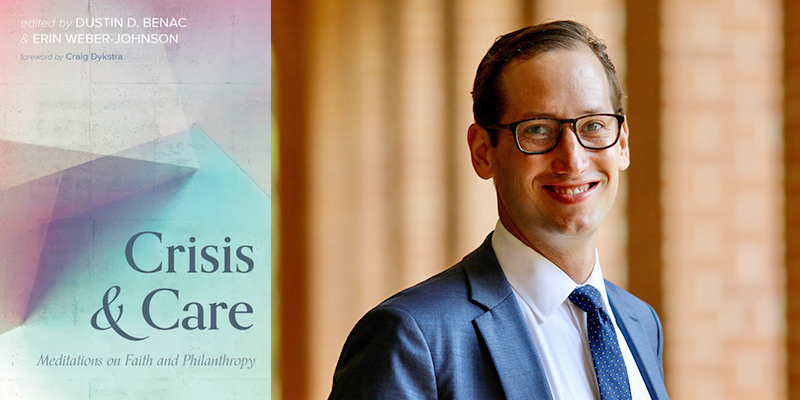Q&A with Dustin Benac and Erin Weber-Johnson on Crisis and Care: Meditations on Faith and Philanthropy

This Q&A with Dustin D. Benac, Visiting Assistant Professor of Practical Theology and Louisville Institute Postdoctoral Fellow at Truett Seminary, and Erin Weber-Johnson, Senior Fundraising Consultant with Vandersall Collective and Faculty for Project Resource, on their co-edited volume Crisis and Care: Meditations on Faith and Philanthropy was prepared and provided by Shanalea Forrest with Wipf and Stock Publishers.
In the early stages of the pandemic, what catalyzed this collaborative work?
We (Co-editors) both felt a need to mark this moment of "crossing over" and transition while also giving witness to the ways we saw care reflected in the form of imagination. As we witnessed how people sought new ways to be with and for one another, we began to wonder how questions surrounding philanthropy served as fulcrum for the imagination in this particular moment. We also sensed that many others may feel this way, so we took a risk. We asked fifteen of our trusted friends, guides, and conversation partners to join us as we tried to capture the wisdom of this moment.
Communities of faith and their leaders face mounting economic challenges. Where do you find hope?
We find hope in the ways alternative economies are being constructed in real time. While multiple crises bring uncertainty, it also sparks imagination and fosters collaboration. In the midst of uncertainty and change, it is vitally necessary, while paying attention to disruptions, to learn from innovative leaders that work across sectors. This constant connection across institutional lines is the foundation for all adaptation. Specifically, it is imperative that we work in collaboration, creating space for voices across academic, congregational life, and the nonprofit sector to reflect on faith and philanthropy.
For readers who want to reimagine the relationship between faith and philanthropy, what’s a good first step?
We (Co-editors) found our own imaginations sparked by being in relationship and conversation with those across institutions and across boundaries of difference. In a time of disconnection, it is vitally important to learn from others outside of our experience. As we marked this time in the volume, we remembered we belong to one another. This reminder, this constant in the midst of change and cultural divisiveness, describes both human need and organizational adaptation. It is fitting then, in belonging, we grow and learn. Finally, context matters, especially as we work to reimagine the relationship between faith and philanthropy. A critical first step is learning to listen, deeply, collaboratively, spiritually, to the places where we find ourselves, and then working to imagine a more hopeful future.
Why should people read this book right now?
We cannot easily forget the feelings of disruption, uncertainty, and loss that mark our individual and collective lives in this moment. We feel it in our bones. The meditations of this volume offer an invitation. Amid the flood and famine of crisis, let us look for and kindle new philanthropic imagination.
What makes this book different from other stewardship publications? (Context, collaboration, etc).
We purposefully bent and blended genres in this volume in order to renew and catalyze imagination. By calling these contributions "Meditations," we invited authors to craft contextually-centered reflections that engaged the shifting ecclesial ecology where faith is formed and may flourish. We also crafted this work in a thoroughly collaborative manner. As communities of faith, those who serve them, and those who study them explore what is possible in the wake of crisis, we think this type of contextual and collaborative approach creates space to renew philanthropic imagination.
Some of your authors include pieces about death and the letting go of “former things”. How do you find imagination in the midst of these transitions?
The depth of loss, grief, and despair in this moment is unshakable. Like a fog that surrounds us and then fills our lungs, the reality of crisis has been imprinted on and in our collective social body. Working with authors throughout this volume invited us to not shy away from our unshakeable encounter with death; rather, we learned to linger in it, discerning how best to be present to ourselves and to our communities, and only then imagine faith-filled responses.